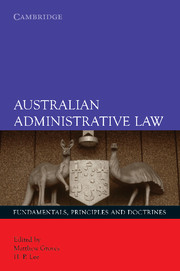Book contents
- Frontmatter
- Contents
- Foreword
- Preface
- About the contributors
- Table of cases
- Table of statutes
- 1 Australian administrative law: The constitutional and legal matrix
- 2 Administrative law in Australia: Themes and values
- 3 The public/private distinction in Australian administrative law
- 4 Australian administrative law: The human rights dimension
- 5 Administrative tribunals
- 6 Australian Ombudsman: A continual work in progress
- 7 Freedom of information
- 8 Delegated legislation
- 9 The concept of ‘justiciability’ in administrative law
- 10 Standing
- 11 Reasons for administrative decisions: Legal framework and reform
- 12 Relevant and irrelevant considerations
- 13 Improper purpose
- 14 Reasonableness, rationality and proportionality
- 15 The ‘no evidence’ rule
- 16 Failure to exercise discretion or perform duties
- 17 Procedural fairness: The hearing rule
- 18 The doctrine of substantive unfairness and the review of substantive legitimate expectations
- 19 The impact and significance of Teoh and Lam
- 20 The rule against bias
- 21 Jurisdictional error without the tears
- 22 Privative clauses and the limits of the law
- 23 Administrative law judicial remedies
- Endnotes
- Index
11 - Reasons for administrative decisions: Legal framework and reform
Published online by Cambridge University Press: 05 June 2012
- Frontmatter
- Contents
- Foreword
- Preface
- About the contributors
- Table of cases
- Table of statutes
- 1 Australian administrative law: The constitutional and legal matrix
- 2 Administrative law in Australia: Themes and values
- 3 The public/private distinction in Australian administrative law
- 4 Australian administrative law: The human rights dimension
- 5 Administrative tribunals
- 6 Australian Ombudsman: A continual work in progress
- 7 Freedom of information
- 8 Delegated legislation
- 9 The concept of ‘justiciability’ in administrative law
- 10 Standing
- 11 Reasons for administrative decisions: Legal framework and reform
- 12 Relevant and irrelevant considerations
- 13 Improper purpose
- 14 Reasonableness, rationality and proportionality
- 15 The ‘no evidence’ rule
- 16 Failure to exercise discretion or perform duties
- 17 Procedural fairness: The hearing rule
- 18 The doctrine of substantive unfairness and the review of substantive legitimate expectations
- 19 The impact and significance of Teoh and Lam
- 20 The rule against bias
- 21 Jurisdictional error without the tears
- 22 Privative clauses and the limits of the law
- 23 Administrative law judicial remedies
- Endnotes
- Index
Summary
To what extent are decision makers obliged to provide reasons for their administrative decisions? Should they be obliged to give reasons in all circumstances and for all decisions? Two decades ago, the then-Chief Justice of the High Court of Australia, Gibbs CJ, stated in the leading case of Public Service Board of New South Wales v Osmond:
The rules of natural justice are designed to ensure fairness in the making of a decision and it is difficult to see how the fairness of an administrative decision can be affected by what is done after the decision has been made.
In 2006, by way of contrast, the Court of Appeal in the United Kingdom in Phipps v The General Medical Council approved as applicable to administrative decision-making a statement in English v Emery Reimbold and Strick Ltd:
[J]ustice will not be done if it is not apparent to the parties why one has won and the other has lost.
These statements reflect different approaches to the question of whether administrative decision makers and tribunals should provide reasons to the person affected by the decision. In the first statement by Gibbs CJ, the view is that providing reasons after a decision is made cannot ensure fairness in the decision which has already been made. The focus of the second statement by the UK Court of Appeal is the individual affected by the decision and his or her need to see that justice has been done.
- Type
- Chapter
- Information
- Australian Administrative LawFundamentals, Principles and Doctrines, pp. 172 - 184Publisher: Cambridge University PressPrint publication year: 2007



